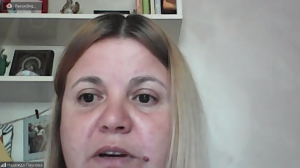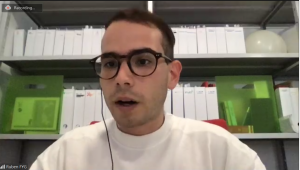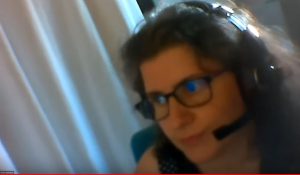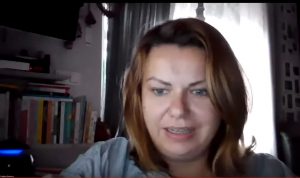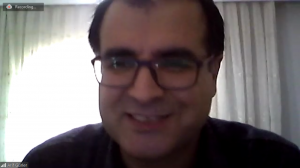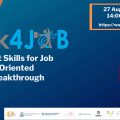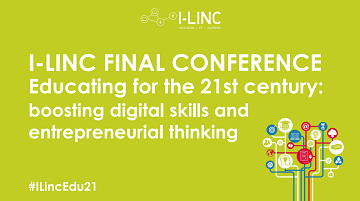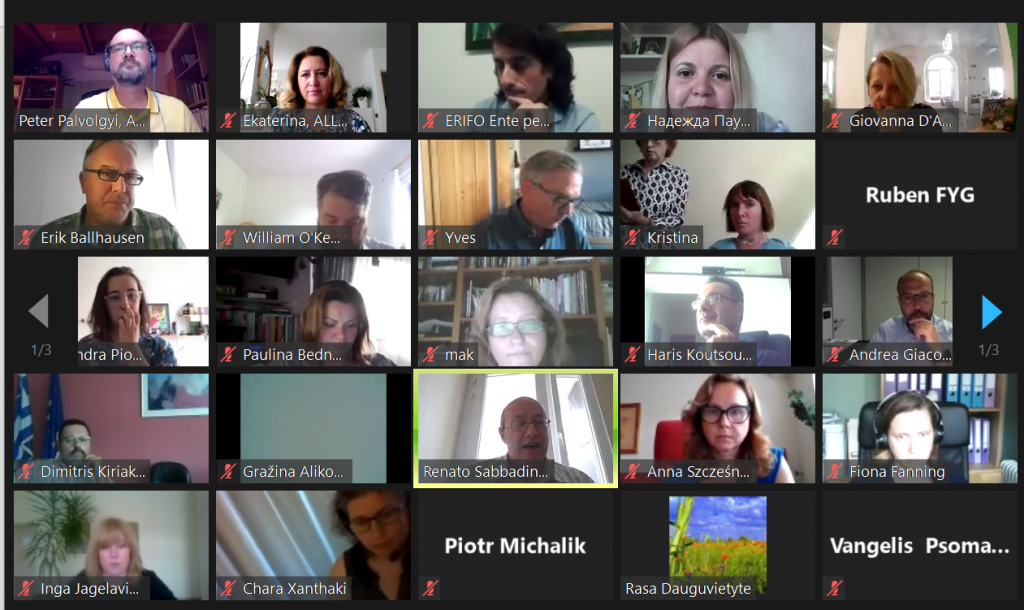
31 Aug Developing digital competences and cognitive skills of low-skilled unemployed adults – Ask4Job project final event
31 Aug, 2020
The final conference of the “Adult Skills for Job-Oriented Breakthrough” (Ask4Job) project took place on 27 August 2020 online. It was organised by ALL DIGITAL and the project consortium and was attended by more than 60 participants.
The purpose of the event was to discuss measures to support the employability and digital skills of adults, and to present the experience and the results of the three-year Erasmus+ Ask4Job project. The aim of the project, implemented by the consortium of 11 partners from 9 countries led by E.RI.FO, was to create a pathway that supports the development of digital competences, mapped to DigComp, and cognitive skills for low-skilled, long-term unemployed adults.
You can see the recording of the event in the video below, and for your convenience we have added the timing when each of the speakers starts their part.
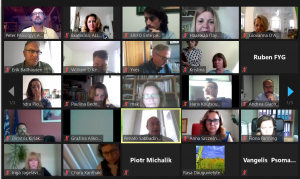 The event was moderated by Peter Palvolgyi, Chief Operating Officer of ALL DIGITAL. First, participants were welcomed by Renato Sabbadini, CEO of ALL DIGITAL (video at 00:04:00), and Giovanna D’Alessandro, President of E.RI.FO (video at 00:09:28). Then conference continued with four keynote speakers who provided valuable and up-to-date information related to the digital skills development and their connection to the employability.
The event was moderated by Peter Palvolgyi, Chief Operating Officer of ALL DIGITAL. First, participants were welcomed by Renato Sabbadini, CEO of ALL DIGITAL (video at 00:04:00), and Giovanna D’Alessandro, President of E.RI.FO (video at 00:09:28). Then conference continued with four keynote speakers who provided valuable and up-to-date information related to the digital skills development and their connection to the employability.
KEYNOTES
Digital skills ecosystem is more crucial than ever
 William O’Keeffe, European Commission DG Employment, presented the EU policy landscape on digital skills issues, Europass and upcoming initiatives on digital skills self-assessment. (video at 00:14:40)
William O’Keeffe, European Commission DG Employment, presented the EU policy landscape on digital skills issues, Europass and upcoming initiatives on digital skills self-assessment. (video at 00:14:40)
Talking about the digital skills ecosystem, William reminded that on 1 July the EU Commission adopted the new Skills Agenda, which is focused on the needs to bring together stakeholders to work together – from education, training, labour market, industry, social partners, and key organisations like partners in the project – so that we can deliver skills for jobs that are specifically linked to labour market needs. And it is specifically cited in the Skills Agenda that we need to empower people as well through innovative tools and through the support for learning pathways and helping people with their careers.
In that respect, William O’Keefe underscored the cross-cutting nature of the Ask4Job project and the way the partners tried to connect provision of education and training with needs of the labour market, with needs of the individual, which is innovative and relevant.
“When I see the elements of the Ask4Job, like the capability labs, self-assessment and the MOOC, it really demonstrates the relevance of what you have done and connects in a very fundamental way to the Skills Agenda that has just been adopted”, said the speaker.
The speaker continued with the Digital Education Action Plan that is supposed to be renewed in autumn and the importance of adopting DigComp in many projects. Special focus was put on Europass – EU framework for communicating skills and qualifications, a lifelong learning open free tool available in 29 languages. Europass allows users to create and manage their personal profiles as well as find information on learning opportunities and jobs. What was launched on 1 July 2020 is so-called phase 1, and the ambition is to have it a dynamic, constantly evolving tool available in all Europass countries. Users could create a Europass CV and a Europass cover letter before, but now they can create a full profile of education, training, and skills history, get analysis of their skills, and indicate interests and goals. And based on all this information, the system will suggest jobs and training courses, in other words it should guide the users to see the connection between their skills and experiences from various parts of life and possible jobs and learning opportunities.
William also mentioned that the Commission is building the digital skills self-assessment tool, encompassing all levels of DigComp, which should be available next year (2021), and it will be possible to incorporate it in the Europass profile.
DigComp addresses the digital skills challenges
 Yves Punie, European Commission, Joint Research Centre (JRC), talked about European Digital Competence Framework for Citizens (DigComp) and examples of its application in training and education. (video at 00:27:40)
Yves Punie, European Commission, Joint Research Centre (JRC), talked about European Digital Competence Framework for Citizens (DigComp) and examples of its application in training and education. (video at 00:27:40)
Yves started with the statistics on the digital skills challenges in Europe, with 35% of the labour force having insufficient levels of digital skills; 42% with no digital skills being unemployed. With COVID-19 the digital skills have become even more crucial, and people are in a way forced to use them. DigComp was created to address the digital skills challenges and to support people in acquiring those skills. Currently DigComp is being used in more than 16 EU member states and in the neighbouring countries, especially in the Western Balkans; there are over 70 projects using DigComp; and already half a million DigComp certificates have been issued by external stakeholders.
The speaker pointed out to two new reports released by JRC in July 2020:
- DigComp at Work – a selection of case studies on how DigComp is put into action on the labour market and
- A more concrete DigComp at Work. Implementation Guide based on those case studies, trying to give hands-on advice and steps how to use DigComp in the context of employment, e.g. what you do when you want to implement DigComp in your project, what to take into account when you are implementing DigComp, how to follow up after the project finishes, and additional strategic considerations.
Key strengths of DigComp, as reported by the case owners:
- A common language and understanding, facilitating mutual learning
- View of digital competence as not just technical, but as key transversal skills, knowledge and attitudes (digital culture) important for all
- Broad, clear and solid structure of the framework, but also flexible
- Technology neutrality (and country independence)
- EU origin, reference framework and sustainability
Lessons learned to DigComp use, as reported by the case owners:
- Basic technical skills are less explicit in DigComp
- Need for localisation, adaptation, translation, and contextualisation, but quite labour intensive,
- Lack of guidance on concrete formulations of proficiency levels and learning outcomes and on flatness of the framework
- Need for stakeholders’ involvement and community of practice
- Need for awareness raising, especially in the world of work
- EU endorsement and label would be desirable.
Currently, together with ALL DIGITAL and consortium, JRC is working on finalizing the pilot of the self-reflection tool, that would feed into the further development of a self-assessment tool to be integrated into Europass, as mentioned by the previous speaker.
Yves remarked that DigComp 2.2. will be released in 2021 and will take into account the current DigComp context, COVID-19, Artificial Intelligence and new emerging technologies.
Pedagogy at the heart of an educational project
 Erik Ballhausen, European Commission, Education, Audiovisual and Culture Executive Agency (EACEA) spoke about pedagogical approaches and methodologies, which bring about digital transformation in and through education. (video at 00:47:25)
Erik Ballhausen, European Commission, Education, Audiovisual and Culture Executive Agency (EACEA) spoke about pedagogical approaches and methodologies, which bring about digital transformation in and through education. (video at 00:47:25)
The importance of policy and social dimension was emphasized during the Juncker Commission. The Social Summit for Fair Growth & Jobs in Gothenburg on 17 November 2017 clearly stated the importance of education and culture supporting this process. At the same time, adult education sector is very wide, it is probably one of the most varying sectors within the EU; all the member states have different systems, so it is very important to have projects that enable working together, exchanging work practices and looking at differences in adult education and how we can learn from each other. There is a huge discrepancy in the need of upskilling by country and within the country, and we need to look at how to improve meaningful cooperation and bring different levels together.
Erik talked about the Ask4Job project in the specific political context of the Erasmus+ Programme and highlighted the positive aspect of having various levels – institutional, regional, national, and EU level within the partnership.
When talking about the importance of pedagogy, Erik remarked about Ask4Job project, that “here pedagogy is really at the heart of the project. The project has a very well-defined methodology that creates focus on the inquiry, what the specific needs of the adults are, what we want to focus on, what the challenges and assumptions are; and it looks at all the levels – institutional, regional, national and EU. The project is successful because the methodology was defined from the beginning, was agreed in the partnership, and was used by all partners. The level of projects improves with the agreement on the methodology because you can get the comparable data.”
Erik mentioned another very important aspect of the project being the grassroots data. The institutions in the partnership are at grassroot level working with adults, and the research, focus groups, and training show the individual aspects.
The speaker continued with the presentation of the Erasmus+ pool of resources that partners can use to support their activities and also disseminate their own work.
EPALE (Electronic Platform for Adult Learning in Europe) platform that has been recently revamped which allows users to make themselves visible, share events, project results, collaborate with other members and find partners for projects.
Eurydice – a network of 43 national units, normally of ministries of education. The platform has a variety of studies, definitions of terms, overviews of educational systems in different countries, structural indicators covering all educational spectrum, helpful Support Mechanisms for Evidence-Based Policy-Making in Education, to name a few. Most of the Eurydice publications are translated in various European languages.
Capability approach can improve digital upskilling of adult learners
 Andrea Giacomelli, ET Expert at EVTA, Project Manager and Developer at ENAIP NET and R&D Area Director at ENAIP Friuli Venezia Giulia, shared the good practices and lessons learned from the digital upskilling of adult learners based on self-directed experiential learning in a widespread and open learning environment. (vide0 at 01:12:30)
Andrea Giacomelli, ET Expert at EVTA, Project Manager and Developer at ENAIP NET and R&D Area Director at ENAIP Friuli Venezia Giulia, shared the good practices and lessons learned from the digital upskilling of adult learners based on self-directed experiential learning in a widespread and open learning environment. (vide0 at 01:12:30)
Who are the low-skilled? 46.1% of the EU28+ population aged 25-64 (128 million adults) is in potential need of upskilling and/or reskilling or 61 million low-qualified people. Digital skills remain particularly scarce among older population, and Andrea’s contribution was based on the research of artisans over 55 to use digital skills.
Research shows that most adult learning is not able to help adults develop skills that are transferable across companies, including basic skills – literacy, numeracy, and digital. They learn the skills that quickly become obsolete and are not useful in supporting their careers. In Andrea’s point of view, there is a lack of work focusing on people’s ability to remain active and competitive, lack of capacity building. Capability approach that is used in the Ask4Job project is useful.
Why is participation in adult education and training so low? There is lack of motivation and understanding of the need for the learning in order to have more opportunities.
To increase participation of low-skilled adults in training, Andrea proposes to focus on:
- Self-directed learning: work on the ability to act by increasing awareness and the ability to rethink one’s career path
- Capability approach: adopt a pedagogical strategy based on experiential learning aimed at focusing on one’s real growth needs and taking action to seize the best opportunities offered
- Open learning environments: use innovative non-formal and informal learning spaces such as co-working and fablab to experiment with new awareness and career guidance paths for lowly qualified learners and not only for highly qualified young people. They are useful because they are based on collaborative and informal learning with the responsibility for one’s development and self-management of it by exploiting all the opportunities available and encouraged.
Ask4Job – Adults Skills Job-Oriented Breakthrough
Project presentation
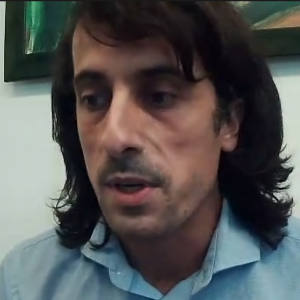 The second part of the event was devoted to the Ask4Job project.
The second part of the event was devoted to the Ask4Job project.
Project manager Andrea Ranelletti from E.RI.FO gave the project overview and presented methodology, training tools, key outcomes and project results. (video at 01:49:00)
Nicole Georgogianni from Best Cybernetics presented the Ask4Job Self-Assessment Tool and MOOC. (video at 02:06:45).
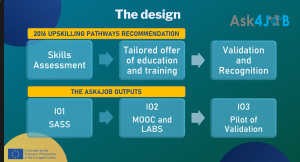
Main outputs of the project and parts of the pathway are:
SASS – Self-Assessment Test
- Assessing the level of digital proficiency through an online quiz
- SASS is based on five areas of the DigComp
- The quiz suggests what pathway the user should follow: BASIC or INTERMEDIATE
MOOC (Masssive Open Online Course)
- Massive Open Online Course divided in two levels (basic and intermediate) and two sections: digital and cognitive upskilling
- Self-directed training platform; users can follow the MOOC at their own pace, following the SASS indication
- Multilingual learning platform available in EN, BG, EL, ES, IT, LT, PL, SE, TR
- Easy to navigate; responsive – available on all devices
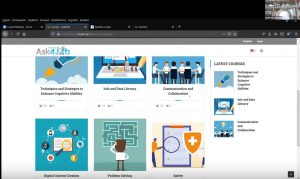 Capability Labs
Capability Labs
- Virtual or face-to face activity to support users in increasing their awareness of digital competences and how to use them in the job search phase
- The operator supports the user actively
- Guidelines for operators
A 5-step Pilot Programme delivered by partners included:
- Selection of participants
- Preparation of participants
- Self-evaluation and MOOC
- Capability labs
- Appreciative recognition and with open badges
For more details, see Ask4Job Project Overview ppt presentation and check all the links above leading to the project website.
Partners’ Testimonies
Then project partners in short lightning talks shared their experience of the project implementation, achievements, lessons learned and plans for the further exploitation of project results.
02:23:15 Bulgaria: Nadezhda Paunova, Business Foundation for Education
02:28:06 Lithuania: Kristina Martinaviciute, Vilnius Adult Education Centre
02:36:45 Spain: Ruben Laguna, FyG Consultores
02:40:50 Greece: Chara Xanthaki, Directorate of Secondary Education, Chania
02:47:30 Poland: Paulina Bednarz, Institute for Private Enterprise and Democracy Foundation
02:54:35 Poland: Daria Modrzejewska, University of the Humanities and Economics in Lodz
03:04:10 Turkey: Arif Gürler, Turgutlu Kaymakamligi
All partners expressed the valuable experience of working in such a large consortium and confirmed that they would continue to disseminate the project results among their stakeholders; to use the developed tools in their activities; and to look for the possibilities to scale the project – to include either other target groups or new skills or levels of DigComp. Most of the partners indicated the interest in the tool among their stakeholders already, and that the course or its elements will be included in their own online platforms and training offers.
Some lessons learned and ideas for exploitation from the project partners:
- Working in such a multicultural and large team is very exciting – you can learn new methods, ways of working and activities for adults
- Exchange of international experience helps to share the labour market within the EU
- Working in a project with so many partners have developed our soft skills
- The COViD-19 pandemic highlighted the crucial importance of citizens’ digital skills, digitisation of the economy, and the reliable and fast internet connection
- Low level of digital skills is still one of the major reasons for digital and social exclusion of the unemployed
- People experiencing digital exclusion are often unable to take the first step themselves – they are scared and don’t know where to start.
- Development of technical competences and cognitive skills should go together
- Developing digital skills is more effective with activities such as coaching and consulting. Those are very helpful for trainees
- Very often people believe to have digital skills, but they don’t own them. Through the MOOC it is possible to learn things you were not aware you didn’t know!
- People working to support employability need innovative and easy-to-use tools
- Teaching and learning using a distance learning platform is still a challenge
- Employers need employees with high cognitive abilities and multi-tasking employees
- This project can continue in not only training the unemployed, but training the professionals that support the unemployed
- The methodology for developing an educational programme could be applied in new programmes – with different target groups, job profiles, etc.
- The Ask4Job learning path and resources can be used to prepare learners for distant learning and teleworking
- The pandemic has created an urgent need for developing effective distant learning methods and training materials; training the teachers and adult educators on a mass scale on effective distant learning teaching methods, adapted to different categories of learners.
Many thanks to speakers, presenters, and participants!
We invite you to check out the project tools on the website https://www.ask4job.net/ and share them among relevant stakeholders.



